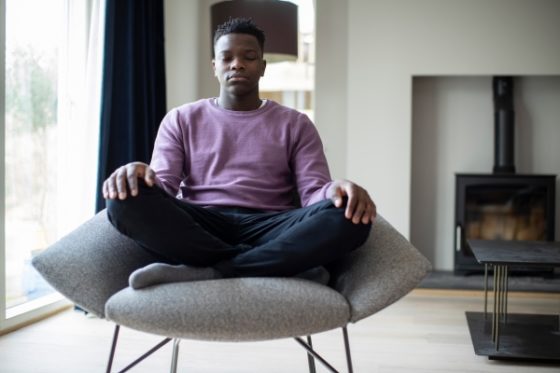Seven Strategies For Dealing With Stress
A lot of events have happened over the past two years. The global pandemic hit, climate change continues to affect our planet, and national controversies make headlines. Experiencing these all at once can be extremely stressful. This is why it is imperative to find strategies for dealing with stress.
Some of these situations may have affected you personally. Although we were all in the same storm, not everyone was in the same boat. As we continue through this global pandemic, it’s important to adjust to our new normal.
Things won’t be the same as they were two years ago. Thus, this may be a difficult transition for some people. No matter where you are in your life, there are resources available to help you. If world events have caused you stress, here are some healthy ways to cope through intense change.

Stress
Many years ago, our bodies adapted ways to react to danger and predators. This became known as the “flight-or-fight response.” When this happens, hormones enter the blood and cause a physical reaction. This will tell the person to either confront the situation or evade danger. You can see this in animals when they freeze and look at you before running away.
When you’re stressed, the body sends out large quantities of chemicals called epinephrine, norepinephrine, and cortisol. These chemicals invoke the following reactions in your body:
- Increased blood pressure
- Elevated heart rate
- Heightened muscle preparation
- Increased awareness
- Sweating
Thankfully, humans no longer have to worry as much about potential predators. Modern stressors look more like aggression, alarming noises, or scary movies. Sometimes, stress isn’t always bad. If you’re interviewing for a potential job, minor amounts of stress can be helpful. But, when taken to an extreme, it can have a negative impact on your life.
Symptoms
As mentioned above, stress can cause physical reactions that come out as minor symptoms. These can be positive or negative, depending on the situation. If you’re on your first date with someone, you may experience the feeling of “butterflies in your stomach.” If you’re running late to an appointment, you may notice that you’re more sweaty when you arrive at your location. These are all ancient reactions that come from stress.
Physical
Stress causes your body to slow down the digestive tract. To make up for alertness, blood flow, and breathing, your body may slow down other parts of the body. This is why you may experience stomach cramps after enduring a stressful situation. This is also why many people get sick when they’re stressed. Since stress lowers your immune system, you become more susceptible to infectious diseases.
Stress can be both positive and negative for your physical health. For example, moving can be stressful, but some may consider it a good thing. The added stress makes you more focused on the activity until it’s resolved. With that said, since stress relies on your cardiovascular system, it can lead to coronary heart disease.
Causes
Stress is very subjective. What may be cumbersome for one person may not be for another. Even thinking about a stressor can be enough to invoke a physical reaction for people who live with triggers. Certain mental health conditions like anxiety, PTSD, and depression can make people more stressed than others. Even so, these don’t cause stress on their own. People in stressful jobs will often be monitored for symptoms of PTSD for these reasons.
Some situations that can trigger symptoms of stress include:
- Family struggles
- Illness
- Job loss or retirement
- Grief
- Moving
- Pregnancy or becoming a parent
- Driving
- Fear of crime
- Feelings of uncertainty
- Relationship of all kinds
- Sensory sensitivities like loud noises
Types
Healthcare professionals need to identify stress to properly care for their patients. The National Institute of Mental Health (NIMH) identifies two main types of stress and three kinds of stressors. One can be temporary, while the other may require a mental health treatment plan. These are known as acute and chronic stress invoked by the following stressors:
- Routine stress: Financial stressors and childcare.
- Traumatic stress: A stressor from a traumatic event like an accident, war, or assault.
- Sudden change: Loss of a loved one or losing a job
Acute Stress
This is the most common form of stress. It’s temporary and usually occurs during normal, everyday situations. For example, someone may feel stress leading up to an important assignment. Once it’s submitted, the symptoms of stress will eventually go away.
Acute stress usually occurs during a new or fixable situation. Thus, it won’t inflict as much damage to the body and chronic stress. Some normal symptoms following acute stress may include an upset stomach and a tension headache. With that said, even if they’re acute, consistent moments of this kind of stress can lead to chronic issues later on.
Chronic Stress
As the name implies, chronic stress develops over a long time. Chronic stress can harm the body by making it difficult to return to a normal state. This can be caused by personal experiences like family difficulties, poverty, or trauma. Since the person can longer see a way out of a difficult situation, they resort to a prolonged period of stress.
Chronic stress can lead to other health conditions like hypertension, type 2 diabetes, and heart disease. It can also contribute to the development of mental health disorders like anxiety, PTSD, and depression. Chronic stress can also contribute to insomnia, immunodeficiency, and reproductive health problems.

Treatment
Treatments can depend on the person, event, and type of stress. Other than some essential self-care, people experiencing acute stress won’t need outside support like medication. This is different for people with chronic stress. Since chronic stress can contribute to many other conditions, treatment may be necessary to prevent future health problems.
For example, a person with PTSD may need medication to help reduce their symptoms of prolonged stress. This can go along with average self-help care. Alternative therapies that people can consider include reflexology and aromatherapy. Before receiving treatment, make sure your insurance covers your mental health needs. This can prevent further stress relating to your treatment plan.
Stress Relief
While stress can be positive, it can have negative consequences if it isn’t resolved healthily. Since stress is the body’s natural reaction to difficult situations, restoring its balance to normal levels is essential. To prevent health problems invoked by stress, it’s important to use healthy coping mechanisms. If you’re experiencing acute or chronic stress, consider trying the following methods.

1. Physical Exercise
Physical exercise is a great way to relieve stress. The results are more effective if it’s done regularly since it reduces anxiety. Exercise improves sleep hygiene, increases confidence, and decreases cortisol, your body’s stress hormone. This is due to a chemical called endorphins, a natural painkiller that improves mood.
Exercise doesn’t need to be intense to be an effective stress reliever. Pick a routine that gives you personal joy and makes you feel good. For some people, this could be a 5-mile run. For others, this could be a 30-minute yoga exercise. This could even include a dance class for people who prefer fun, fast-paced activities. Don’t increase stress by forcing yourself into an exercise that you don’t like. Pick something that’s accessible and unique to your needs.
2. Decrease Caffeine Intake
People don’t always think about it, but caffeine can majorly contribute to stress and anxiety. This is because caffeine is a stimulant, making you more alert and focused. For this reason, caffeine can help people complete certain daily tasks. For people that already live with anxiety or chronic stress, caffeine can elevate symptoms.
Consider cutting back if you’ve noticed your symptoms worsening after drinking caffeinated tea, coffee, or energy drinks. Granted, everyone’s tolerance for caffeine is different. This can make it difficult to know how much you can ingest. You may need to restrict yourself from any form of caffeine whatsoever. Even so, consider drinking decaf coffee or sticking with non-caffeinated, herbal teas.

3. Socialize
People thrive off of socialization, even if they’re introverts. Granted, one’s form of a social group may look different depending on their preferences. Even so, if you’re going through a stressful time, reach out to a friend or loved one. Sometimes, taking some time to talk about your feelings can be enough to reduce stress.
Friends and family can help you feel supported during difficult times. If you’ve lost a loved one or experienced a breakup, a comforting friend may be a great way to cope with the stress. This can look different for certain people. What matters is that you reach out to at least one person.

4. Journal
Writing is a fantastic way to cope with stress. Use a personal journal to write down everything on your mind in a judgment-free environment. A journal can also be great for processing emotions that are increasing anxiety and stress.
If you have difficulty writing down your feelings, there are other ways to journal. You can also try to write down all the things you’re grateful for. This can help decrease stress and anxiety by focusing on things going well in the present moment.
5. Set Boundaries
You can’t always control the world around you, but you can control the decisions you make for yourself. Setting boundaries can help you decide what you need while being respectful of other people’s choices. For example, if your boss tries to contact you after your designated working hours, you have the right to say “no.”
It’s important to remember that “no” is a complete sentence. If you’re taking on more than you can chew, this can increase stress. This can cause you to react in negative ways, making you feel bad for your actions. To protect yourself and others, be selective about what you do. Focus on what’s important to you and be firm when others try to overstep those boundaries.

6. Practice Meditation
There are nine forms of meditation that can be helpful for certain people and situations. These practices can be as simple as walking in nature or performing an act of kindness. Meditation can even go along with spiritualism, depending on your preferred practice and/or religion. Some common forms of meditation include yoga, deep breathing, and mindfulness.
For example, mindfulness is a form of meditation that focuses on the present moment. It can decrease feelings of anxiety related to negative thinking. Yoga can be a part of almost every form of meditation. Its main focus is the convergence of the body and mind. Finally, deep breathing can help reduce the body’s fight or flight response. It helps trigger your body’s relaxation response, resulting in reduced stress and anxiety.
7. Breathe
When you’re stressed, cortisol makes your body go into a “fight or flight” mode. This is a result of your sympathetic nervous system, which makes you feel the physical effects of stress. When this happens, your heart rate increases, your breath shortens, and your blood pressure increases.
The opposite reaction to this is the parasympathetic nervous system, which triggers the relaxation response in your body. Breathing exercises can help bring this out in a shorter amount of time during stressful situations. When you use breathing techniques, your heart rate slows down, and your blood pressure decreases. This will help you feel more relaxed, safe, and at ease.
Children undergo a lot of changes during their teen years. From physical, emotional, social and psychological changes, teens have a lot going on, as young as we may see them. Here’s how to help your teen cope with stress and anxiety.






